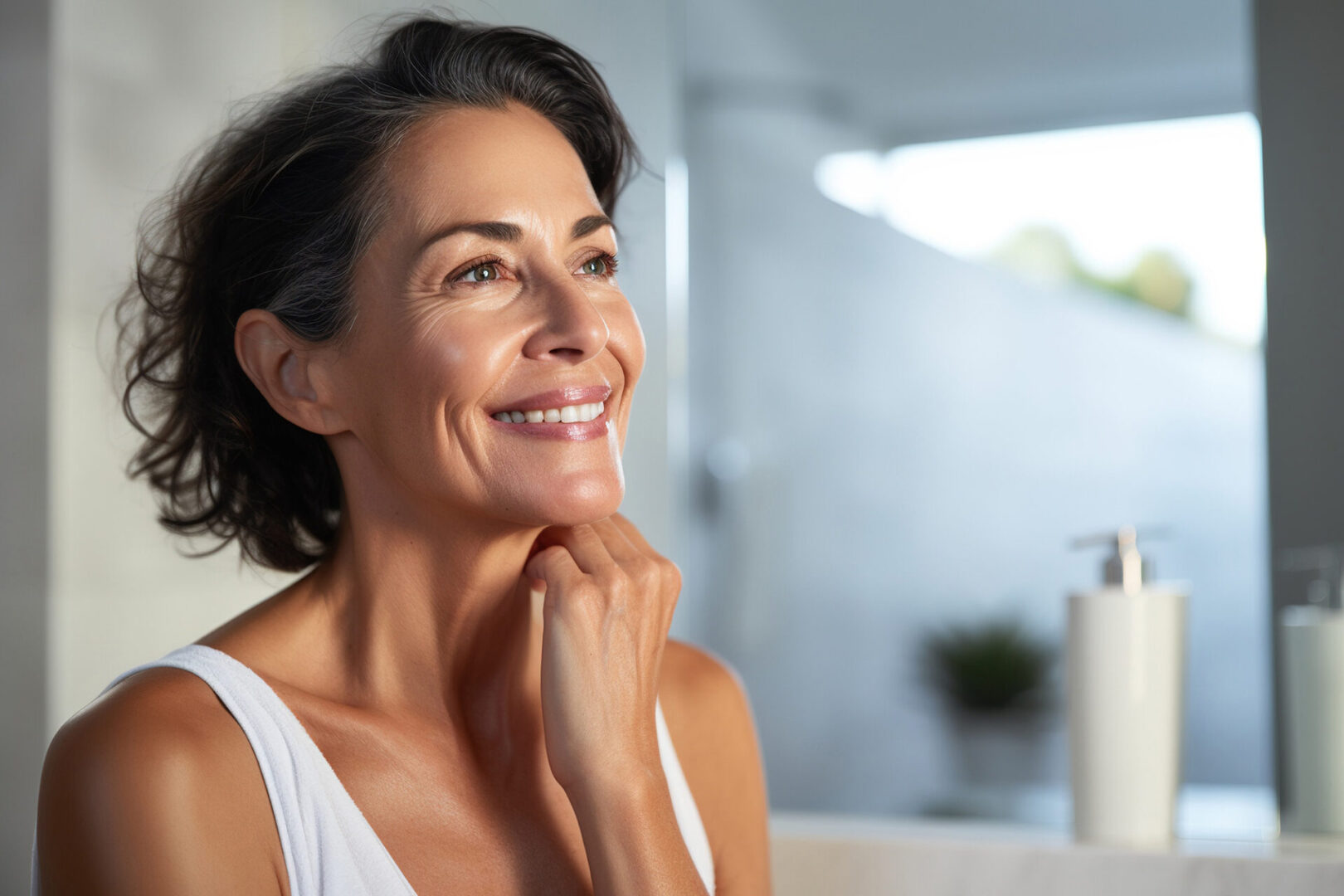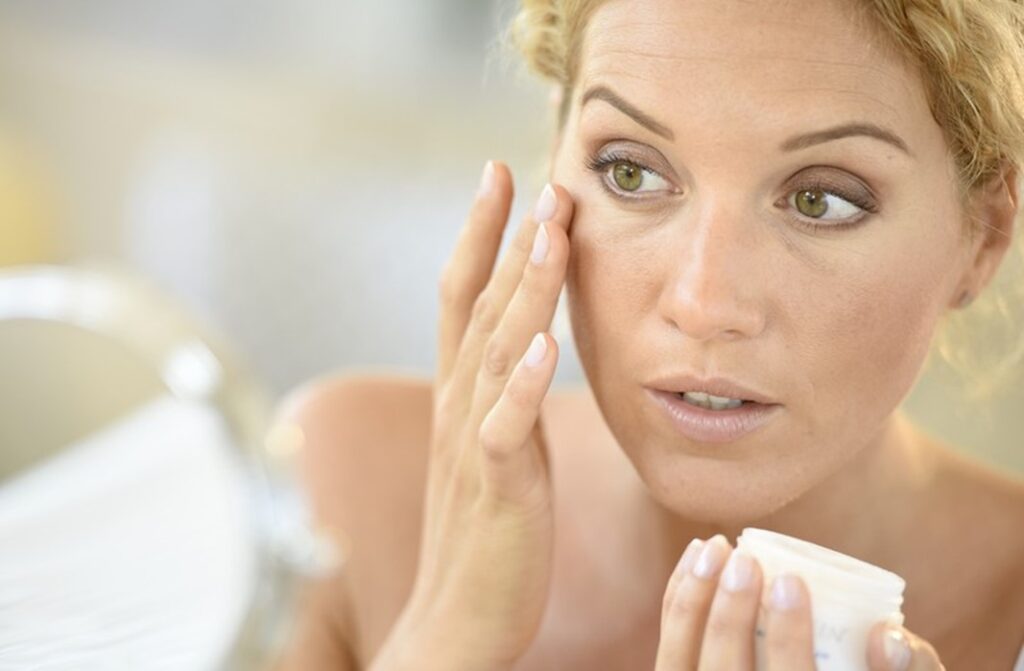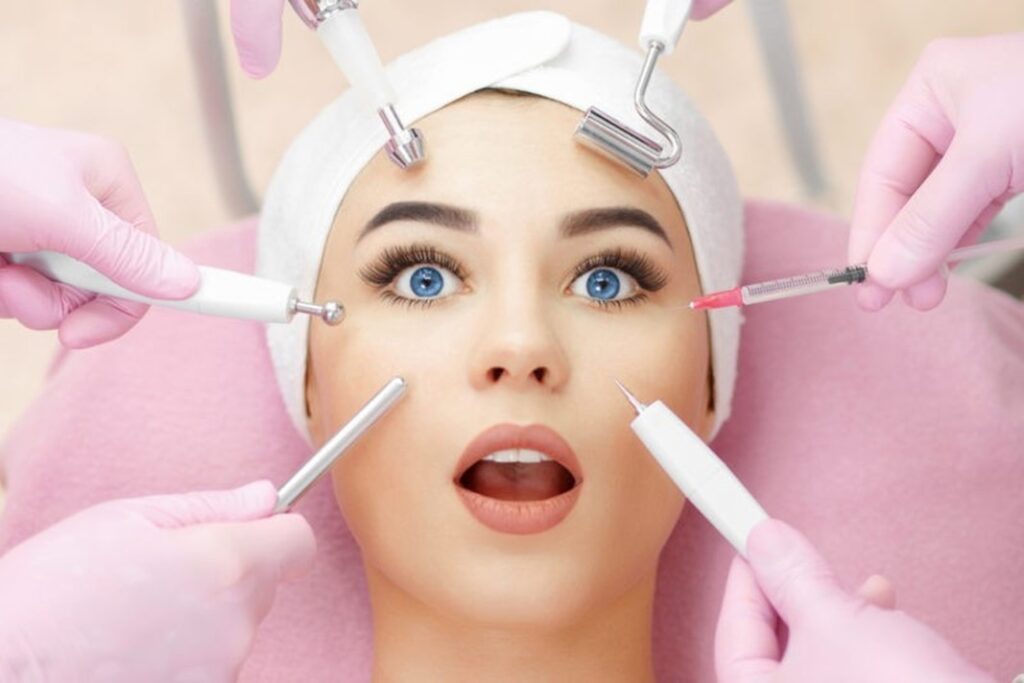The menopause skincare guide

The Hitchhiker’s Guide to Skincare in menopause: Discover how your skin changes & what can help.
There are so many things that affect our skin quality – pollution, too much sun exposure and declining hormones are just some. In fact, its said that in the first 5 years after menopause we lose 30% of our collagen and continue to lose around 2% every year after that.
The result? Fine lines and wrinkles are just part of the story but many women find their skin becomes drier and more sensitive too.
So can skin care help? The answer is yes… depending on what’s in it.
How Your Skin Changes After 40
Declining estrogen levels doesn’t just affect collagen – the scaffolding that keeps the skin looking firm, they also affect elastin, the fibres that give the skin its bounce and stretch. But it doesn’t end there, it also affects the skin barrier. The skin barrier is the body’s defence system – it keeps the nasty bacteria we don’t want out, but also keep moisture in. It’s secret is a layer of fats called ceramides, but as out hormones decline, they go with too and this means our skin loses more water. This is known as trans-epidemal water loss or TEWL.
This can make our skin drier but it can also lead to increased sensitivity. Many women find they have rosacea flare ups or can no longer tolerate products they have used in the past.
But it’s not just hormones at play – pollution, stressful environments and sunshine all take their toll.
- Ultraviolet (UV) light – Exposure to the sun’s powerful UV rays is one of the most influential factors when it comes to skin-related ageing. UV light has a corrosive effect on elastin fibres and collagen, the two things that are responsible for supporting firm, smooth skin. But it also causes an increase in pigmentation – sun spots or age spots. UVB is responsible for the burn but UVA is responsible for skin aging, and both are associated with different types of skin cancer.
- High stress – Stress impacts almost every aspect of our physical health, and skin is no exception. High levels of stress, particularly chronic stress, can raise the levels of certain hormones like cortisol, and it can also impact on the way the body uses the sugars it needs for energy and this combination may aggravate many skin issues including eczema, rosacea, and psoriasis. It can also cause fluctuations in natural oil production.

The fix?
When it comes to mature skincare, you’d best know your AHAs from your BHAs, your retinol from your retinal and get to know Niacinamide (vitamin B3). There is an abundance of products and procedures touting miraculous properties. But not all of them are worth investing in.
First off, let’s go through some buzzwords.
- AHA stands for Alpha Hydroxy Acid, which is a type of water-soluble acid that exfoliates, promotes smoother, softer skin and can help with improving pigmentation and making your retinal (vitamin A) more effectively absorbed
- BHA stands for Beta Hydroxy Acid, an oil-soluble acid that removes excess sebum and dead skin cells and is particularly useful for acne-prone skin, sensitive skin and reducing inflammation
- Poly-hydroxy acids – just to throw one more into the mix, are larger molecule acids that are more gentle on the skin when it comes to exfoliation. They are great for dry and rosacea-prone skin
- Retinol and retinal are types of vitamin A that have been shown to stimulate collagen production, even skin tone, help smooth wrinkles and reduce pigmentation
- Niacinamide is a form of vitamin B, which helps to build up and protect the skin barrier, reducing inflammation and soothing irritated skin
- Vitamin C – this is a must for skin brightening, evening skin tone, and boosting collagen. Make sure though that it is in a light-proof, air-tight container as it’s highly unstable and can ‘go off’ quickly. If it’s darker than straw colour, time to replace it.
- Ceramides are fatty substances that are found naturally in the skin that help restore the skin barrier
- Hyaluronic acid (HA)- also found naturally within the skin, keeping it plump and well hydrated.
You’ll find many anti-ageing skincare products that contain these ingredients, but don’t forget, the single most important skincare product according to dermatologists is sunscreen.
- Sunscreen – The less exposure to the sun’s UV rays your skin has, the better. If possible, pick out one with a high sun protection facts (SPF) which also is ‘broad spectrum’, that is, it protects against both UVA and UVB rays. Whether it is mineral-based like zinc oxide or ‘chemical’ is up to you – as long as you use one every day, 365 days a year, is all that matters. UVA protection is important as UVA rays can penetrate glass, so if you sit next to a window at work or drive for a living, UVA protection is a must have!
- Deep moisturiser – Hydrating your skin is very important for retaining suppleness, brightness, and that multi-level glow. As you approach menopause and all the changes it brings, your skin needs a moisture boost, so you’ll need to pick a moisturiser that’s rich and nourishing. Look for products with ceramides and peptides.
- Anti-inflammatory serum – Redness and puffiness can be difficult to tame without an anti-inflammatory product. Choose one enriched with vitamins B3, and E as these vitamins help to calm the skin. Vitamin C can be great for most skin types but may aggravate people with who are prone to acne.
- Retinal vs retinol– vitamin A comes in many forms. Tretinoin is the prescription form but the most common over-the-counter version is retinol. It has its downsides and in fact the EU is limiting its concentration in products as it can cause irritation. Retinal, on the other hand is one step closer to tretinoin so it more effective, and, it’s less irritating. You’ll be seeing more of this in products in the future. (And yes, you can use it around your eyes!)
- Under-eye brightening cream – Choose a cream or gel that’s refreshing and that you can massage under your eyes after a poor night of sleep or an indulgent weekend. These creams reduce the appearance of dark circles and enrich the sensitive skin under your eyes. Some contain elements that reflect light giving the appearance of brighter eyes. Caffeine is also used sometimes for a mild but temporary skin tightening effect.
There are plenty of other products that can also provide skin support, but these are the staples you want to invest in on your menopausal skincare journey without having to payout for expensive treatments.

Future-Proofing Your Face
One of the best ways to maintain healthy, bright, and supple skin throughout your peri and postmenopausal years is to put measures into place now that will benefit you later in life.
Healthy habits like:
- reducing your alcohol consumption
- eating foods that are rich in vitamins A, B3, C, and E
- don’t smoke
- minimising time under the sun (unless well-protected) can all help play a role in the long-term vitality of your skin.
But perhaps most important of all, remember to be kind to your body for carrying you through all of these years, and embrace your age with as much love and gratitude as you can muster.
Wrinkles, marks, and lines all show your resilience as a human—a glorious and fabulous one, at that.
For a skin care regime tailored to your skin needs, consider The Skin Diary. Bespoke skin care, designed by dermatologists, and delivered fresh to your door every month.

